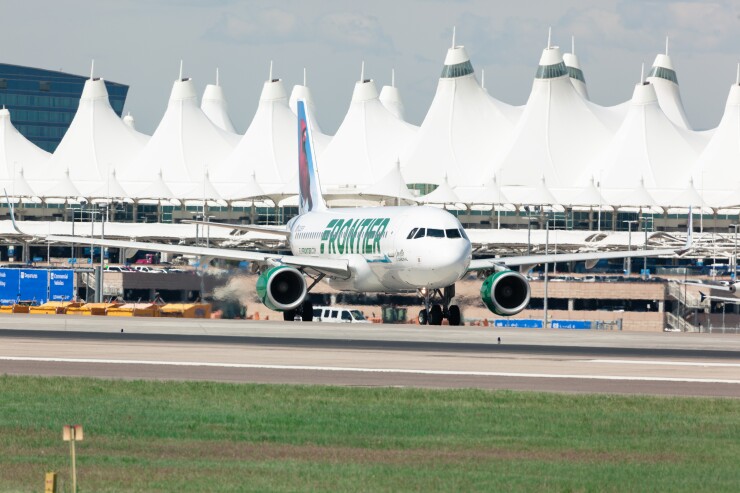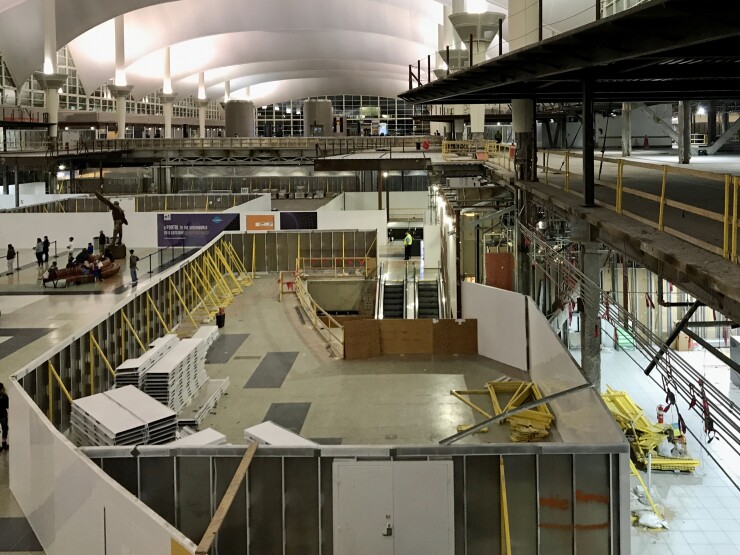First came the termination of the public-private partnership deal to renovate the main terminal at Denver International Airport. Now it's time to tally up the costs.
Denver International Airport expects to pay between $170 million to $210 million to terminate the deal with Great Hall Partners. Closing out the failed public-private partnership will allow the airport to resume redevelopment of the main terminal with a new contractor, officials said.

The airport
“In January, DEN will initiate the contracting process for Hensel Phelps as the project general contractor,” the airport said Thursday in announcing the GHP termination costs. “It is expected that work on the project will fully resume in late Q1 2020. Once the new general contractor is on board, DEN will have more information regarding the project schedule.”
DEN is the official airport code, as seen on luggage tags, and is sometimes used as a shorthand for the facility.
Officials said the design and construction cost of the terminal project would remain within the original budgeted amount of $770 million. That included a contingency fund of $120 million, which is $50 million shy of the lowest termination cost projection. Yet to be announced are financial terms with Hensel Phelps for completion of the project under airport supervision.
Redevelopment of the 24-year-old Jeppesen Terminal is part of a $3.5 billion capital improvement program at the airport geared toward expansion and security requirements. About 30% of gate expansion has been completed.
Great Hall Partners' financial pledge of $378 million represented about 27% of the project cost, and the city was funding about 73%. As a result of the termination, Denver must reimburse GHP for the money that it spent on the project for work completed.
GHP, led by Ferrovial Airports with an 80% stake, closed on its contract with the airport on Dec. 22, 2017, a day after the consortium issued $189 million of bonds.
Great Hall Partners defeased its bonds, which were issued through the Wisconsin-based Public Finance Authority, on Dec. 9, according to
Just four months after work on the terminal began, it was halted in November 2018 when crews discovered substandard concrete in the existing structure. Nine months later, after discussions of how to resolve the problem, the airport announced that it would end the partnership.
Thus far, Denver has reimbursed GHP about $128 million, officials said. That includes $90.4 million for net lender’s liability, $37.7 million for equity and return on investment, and $130,994 in redundancy costs. The costs
Net lenders liability is the amount of money GHP spent to design, build, and manage the work completed. The airport now owns all the work, including the intellectual property such as design drawings and calculations. GHP will use the refunded money to pay back the bonds they issued.
The return on investment that Great Hall Partners’ owners would have received over the 34-year life of the contract is part of the termination payment.
Redundancy cost goes toward terminating employees, severance payments, unpaid accrued time off, moving costs and other expenses.
Still to be settled are what are known as “contractor breakage costs” for demobilizing from the site, materials and equipment ordered that cannot be stopped or returned and other expenses.
“The termination-related payments are separate from any amounts that the city might have to pay as the claims made by Great Hall Partners are resolved,” the airport said in a newsletter this month. “These claims-related costs are in dispute.”
One year after construction was halted, projected completion of the project has been pushed back a year to 2023.
The collapse of the partnership and subsequent delay in construction has not harmed the airport's bond ratings.

Moody’s Investors Service elevated its outlook on the airport’s A1 rating to positive from stable on Oct. 24. The action impacts $6.12 billion of outstanding debt.
“The positive outlook reflects Moody's opinion that the airport could see significant progress and reduction of construction risk through the next year while maintaining current budgets, which could result in an upgrade if operational and financial conditions remain stable,” analyst Earl Heffintrayer wrote.
“Risks associated with re-starting the Great Hall Project after the city terminated private partner Great Hall Partners, LLC, remain the greatest challenge to the airport's credit profile over the next few years,” Heffintrayer said. The ultimate cost of the project will not be known until 2020, he added.
The Moody’s outlook preceded an issue of about $205 million of airport revenue refunding bonds backed by the airport’s credit.
S&P Global Ratings affirmed its A-plus rating on the airport bonds, with a stable outlook. Fitch Ratings also affirmed its AA-minus rating.
The airport is owned by the triple-A-rated City and County of Denver. Though city-owned, the budget of the self-sustaining airport enterprise and city are separate.
“The termination of the project and subsequent repayment of the project debt will not have an impact on DEN's rating,” Fitch said.
The airport’s gate expansion project is adding 39 gates, an increase in gate capacity of 30%. Gates will be added on all three concourses to allow expansion of service. The three concourses connect to Jeppesen Terminal with automated people movers. The gates are expected to be open in 2021.
The Great Hall project will include upgrades for the entire terminal, including escalators and elevators, restrooms and other infrastructure that is only 24 years old.
“The Great Hall project includes some complicated aspects, especially with respect to protecting passenger flows, however those are passed down to the contractor under a fixed-price contract,” Heffintrayer wrote. “Projects of this size can never be free of construction risk. However, the complexity of these projects and the contracting methods used place DEN's construction risk below that of its peers that are significantly altering existing facilities.”
Fitch sees strong revenue and passenger growth offsetting increased leverage to cover Denver International’s $3.5 billion expansion.
“Fiscal 2018 data suggest strong financial metrics, as exhibited by senior debt service coverage of 2.42x and total DSCR of 1.74x,” Fitch director Mario Angastiniotis said. “Total leverage (net debt to cash flow) is projected to remain elevated at 7x over the forecast period and decline to about 6.3x by 2023 under Fitch's rating case.”





